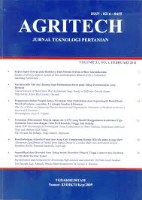
Agritech
Scope & Guideline
Shaping Sustainable Practices for a Greener Tomorrow
Introduction
Aims and Scopes
- Sustainable Agricultural Practices:
Research focusing on sustainable methods in crop production, including the use of bio-fertilizers, organic farming techniques, and innovative irrigation practices. - Food Technology and Processing:
Studies on the physical and chemical properties of food products, including food preservation methods, nutritional enhancements, and the development of functional foods. - Supply Chain Management in Agriculture:
Analysis of logistics, supply chain efficiencies, and market dynamics within the agricultural sector to improve distribution and reduce waste. - Consumer Behavior and Market Analysis:
Examinations of consumer preferences and perceptions related to agricultural products, including studies on purchasing decisions influenced by quality and sustainability. - Biotechnology Applications in Agriculture:
Research on the application of biotechnological advances, including genetic modifications, enzyme applications, and bioactive compounds in improving crop yields and food quality. - Environmental Impact and Resource Management:
Research addressing the environmental implications of agricultural practices, including waste management, resource conservation, and the impact of climate change on agriculture.
Trending and Emerging
- Smart Agriculture Technologies:
There is an increasing focus on the integration of smart technologies, such as IoT and AI, in agriculture, aiming to optimize resource use and enhance crop monitoring. - Functional Foods and Nutraceuticals:
Research exploring the development of functional foods that offer health benefits beyond basic nutrition is gaining traction, reflecting consumer demand for healthier food options. - Waste Utilization and Circular Economy:
Emerging studies are focused on utilizing agricultural waste for value-added products, emphasizing the circular economy and sustainability. - Climate-Resilient Crop Varieties:
Research on developing and promoting crop varieties that can withstand climate change impacts is increasingly significant, addressing global food security. - Integrated Pest Management (IPM):
An uptick in studies related to sustainable pest management strategies, combining biological, cultural, and technological methods to minimize chemical pesticide usage.
Declining or Waning
- Traditional Farming Techniques:
Research papers focusing on conventional farming methods have decreased, possibly due to the increasing emphasis on modernization and sustainability in agricultural practices. - Basic Crop Production Studies:
There has been a noticeable reduction in studies solely focusing on traditional crop production without integrating technology or sustainability aspects. - Animal Husbandry Practices:
Articles centered specifically on animal husbandry have become less frequent, suggesting a shift towards crop-related innovations and plant-based agricultural research. - Single-Factor Agricultural Studies:
Research that examines single-factor influences on agriculture (e.g., only soil quality without considering environmental or technological factors) appears to be declining in favor of more integrated approaches.
Similar Journals

SPANISH JOURNAL OF AGRICULTURAL RESEARCH
Pioneering Research in Agronomy and Crop ScienceThe Spanish Journal of Agricultural Research (ISSN: 1695-971X, E-ISSN: 2171-9292), published by the prestigious Consejo Superior Investigaciones Cientificas (CSIC), serves as a vital resource for those engaged in the fields of agronomy and crop science. Established as an Open Access journal since 2003, it aims to foster the dissemination of innovative research and practical applications related to agricultural practices and sustainability. With its Q3 category in Agronomy and Crop Science and a Scopus ranking of #224 out of 406, the journal provides an accessible platform for scholars to share valuable findings that enhance agricultural productivity and environmental stewardship. Covering research from 2006 to 2024, this journal continues to be instrumental for researchers, professionals, and students eager to remain at the forefront of agricultural science advancements.

Temas Agrarios
Championing Open Access to Transformative Agricultural ResearchTemas Agrarios is a premier scholarly journal focused on the dynamic field of agricultural sciences, published by the University of Córdoba, Faculty of Agricultural Sciences. Since its establishment, this journal has committed to advancing knowledge and fostering research in agricultural practices and policies, contributing significantly to the discourse surrounding food security, sustainable farming, and rural development. With an open access model implemented in 2003, Temas Agrarios ensures that critical information and research findings are readily available to the global academic community, promoting wider dissemination and accessibility. Researchers, professionals, and students can benefit from its insightful articles, which address pressing agricultural issues in Colombia and beyond, enhancing both local and international scientific dialogue. Although specific impact metrics such as H-index and Scopus rankings are not disclosed, the journal's longstanding presence underscores its importance as a platform for high-quality agricultural research.
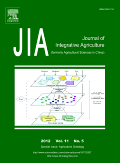
Journal of Integrative Agriculture
Pioneering Integrative Solutions for Global AgricultureJournal of Integrative Agriculture, published by Elsevier Science Ltd, stands as a leading platform for innovative research at the intersection of agricultural sciences. With a significant focus on integrative approaches, this journal has established itself within the academic community, reflecting its excellence through impressive Impact Factor rankings and a consistent Q1 category status in multiple fields, including Agronomy, Animal Science, and Ecology. The journal spans a wide range of topics, making it a critical resource for exploring advancements in Biochemistry, Food Science, and Plant Science. With its diverse Scopus rankings—from Rank #3 in Food Animals to Rank #14 in Animal Science—it serves as a vital repository for cutting-edge research that influences both scientific inquiry and practical applications in the agricultural domain. Operating from China and accessible through open access options, the Journal of Integrative Agriculture aims to foster collaborative research and knowledge exchange among scientists, professionals, and students worldwide, supporting the growth and sustainability of agricultural practices.
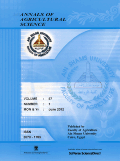
ANNALS OF AGRICULTURAL SCIENCES
Empowering the Agricultural Community Through Open Access ResearchANNALS OF AGRICULTURAL SCIENCES, published by Elsevier, stands as a leading open access journal dedicated to the multifaceted field of agricultural sciences. Since its inception in 2011, this journal has served as a pivotal platform for the dissemination of high-quality research, covering areas such as agronomy, animal science, horticulture, food science, plant science, and soil science. With an impressive Q1 ranking across multiple disciplines and notable positions in Scopus Ranks—including #6 in Animal Science and Zoology and #3 in Horticulture—this journal is recognized globally for its significant contribution to advancing agricultural innovations. The journal caters to a diverse audience of researchers, professionals, and students, providing them with open access to cutting-edge studies that address critical issues in agricultural productivity and sustainability. Its commitment to high-impact research ensures that articles contribute meaningfully to the scientific community, fostering advancements in agricultural practices and policies.
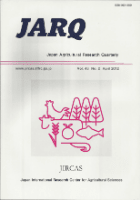
JARQ-JAPAN AGRICULTURAL RESEARCH QUARTERLY
Advancing Agricultural Innovation for a Brighter FutureJARQ - Japan Agricultural Research Quarterly serves as a pivotal platform in the field of agricultural sciences, published by the esteemed Japan International Research Center for Agricultural Sciences. Established in 1973, this journal has a rich history and plays a critical role in disseminating significant research findings relevant to agronomy, crop science, animal science, ecology, and biotechnology. Despite its ranking in the lower quartiles, with impressive coverage from 1973 to 2024, it continues to attract contributions that enhance agricultural strategies and practices in Japan and beyond. The journal facilitates discussions that are essential for fostering innovation in agricultural methodologies and environmental sustainability. Accessible to a diverse audience, including researchers, academics, and practitioners, JARQ emphasizes the importance of advancing agricultural research and its implications for food security and ecological balance.

AIMS Agriculture and Food
Fostering dialogue for a sustainable agricultural landscape.AIMS Agriculture and Food is a leading open access journal published by the American Institute of Mathematical Sciences (AIMS), focused on the critical intersections of agricultural and food sciences. Since its inception in 2016, this journal has provided a vital platform for disseminating innovative research and advancements in the fields of agricultural and biological sciences and food science. With impressive Scopus rankings, including a Q2 categorization in 2023 for both Agricultural and Biological Sciences (miscellaneous) and Food Science, AIMS Agriculture and Food is recognized for its significant contributions to the academic community. The journal aims to foster interdisciplinary dialogue by welcoming submissions that tackle contemporary challenges, promote sustainable practices, and enhance food security. Researchers, professionals, and students will find this journal an invaluable resource, offering open access to high-quality, peer-reviewed articles that are essential for informed decision-making in agriculture and food industries.

PAKISTAN JOURNAL OF AGRICULTURAL SCIENCES
Exploring Agricultural Frontiers for a Sustainable FutureWelcome to the Pakistan Journal of Agricultural Sciences, a prominent platform for disseminating vital research findings in the fields of agronomy, crop science, food science, plant science, and soil science. Published by the prestigious University of Agriculture in Faisalabad, this journal aims to enhance the scientific discourse surrounding agricultural innovation and sustainability in Pakistan and beyond. With an ISSN of 0552-9034 and E-ISSN of 2076-0906, the journal serves as a valuable resource for researchers, professionals, and students interested in cutting-edge agricultural developments. As of 2023, the journal is ranked in the Q3 category for Agronomy and Crop Science as well as Food Science and positioned in Q4 for Plant and Soil Science, highlighting its growing impact within a competitive academic landscape. While the Pakistan Journal of Agricultural Sciences is not currently open access, it provides a comprehensive archive of research converging from 2011 to 2024, ensuring that critical knowledge remains accessible to those striving to advance the agricultural sciences. Join us in our mission to foster innovation and support sustainable practices in agriculture.
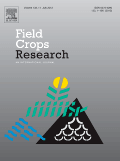
FIELD CROPS RESEARCH
Shaping the Future of Field Crops Through KnowledgeFIELD CROPS RESEARCH is a premier academic journal published by Elsevier, dedicated to advancing knowledge in the fields of Agronomy and Crop Science as well as Soil Science. Now in its 46th year of publication, this esteemed journal has established itself as a leading resource, holding a prestigious Q1 ranking in both the Agronomy and Soil Science categories, with a remarkable blend of rigorous peer-reviewed research and innovative findings. With a Scopus ranking of #27/406 in Agronomy and #20/159 in Soil Science, and a notable 93rd and 87th percentile respectively, FIELD CROPS RESEARCH plays a vital role in informing practices that drive sustainable agriculture and optimize crop production. Although not an open access journal, it remains highly accessible to the global research community and offers critical insights that influence policy and agricultural practices worldwide. Researchers, professionals, and students are encouraged to delve into this journal, as it continues to shape the future of field crop research through impactful studies and comprehensive reviews.
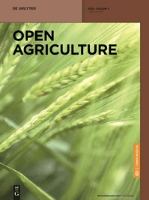
Open Agriculture
Fostering Collaboration in Agricultural ScienceOpen Agriculture, published by DE GRUYTER POLAND SP Z O O, is an innovative open-access journal dedicated to advancing research in the Agricultural and Biological Sciences. Since its inception in 2016, this journal has been committed to disseminating knowledge and facilitating collaboration among researchers, professionals, and enthusiasts in the agricultural sector. With an impressive Q2 ranking in the Agricultural and Biological Sciences category, it holds a prestigious position, ranking #65 out of 221 in its field, placing it in the 70th percentile. Open Agriculture offers a platform for high-quality research across a diverse range of topics, ensuring that crucial findings are readily accessible to the global scientific community. The journal continues to uphold its mission of promoting sustainable agricultural practices and innovations that address contemporary challenges in food security and environmental sustainability. With its strong commitment to open access principles, researchers and students alike can easily engage with cutting-edge research and contribute to the vibrant discourse surrounding modern agriculture.

Journal of Agriculture and Food Research
Empowering Research for Global Food SecurityJournal of Agriculture and Food Research, published by ELSEVIER, is a premier Open Access journal that has made significant strides in the fields of agricultural and biological sciences since its launch in 2019. With an ISSN of 2666-1543, the journal is headquartered at Radarweg 29, 1043 NX Amsterdam, Netherlands. It holds a remarkable position in the 2023 Category Quartiles, achieving Q1 rankings in Agricultural and Biological Sciences (miscellaneous), Agronomy and Crop Science, and Food Science. The journal's impactful research is reflected in its impressive Scopus ranks, including a ranking of #25 in Agricultural and Biological Sciences, showcasing the journal's commitment to high-quality, innovative research relevant to contemporary agricultural challenges. Researchers, professionals, and students can benefit from its diverse array of published works, fostering a greater understanding of food security, sustainable agriculture, and innovative food technologies. By embracing an open access model, the journal ensures that critical research is readily available to a global audience, aiming to enhance knowledge dissemination in this vital field.